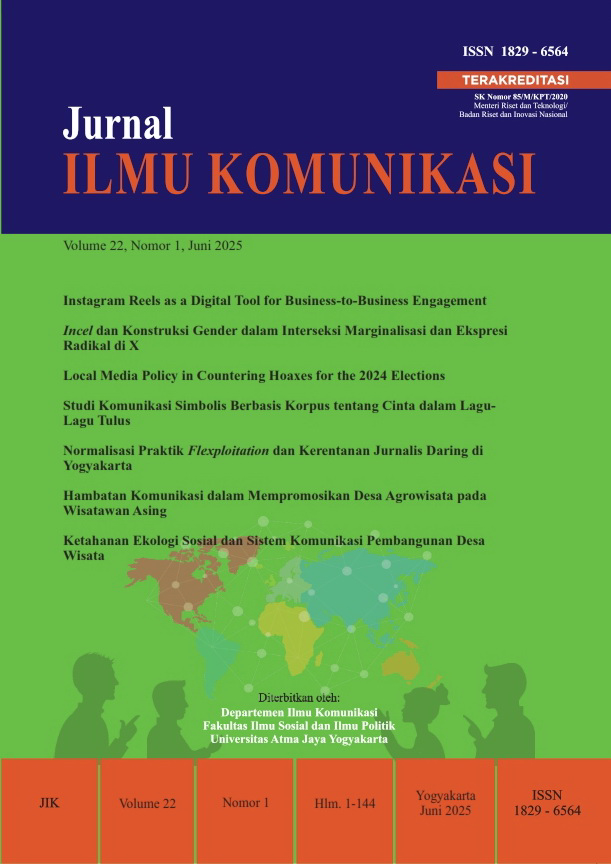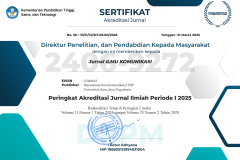Local Media Policy in Countering Hoaxes for the 2024 Elections
DOI:
https://doi.org/10.24002/jik.v22i1.10502Keywords:
hoaxes, media policy, local media, the 2024 electionsAbstract
The spread of hoaxes is one of the challenges of the 2024 elections, as they can disrupt public trust in candidates. This research compares local media policies in countering hoaxes during the 2024 elections. Local media play an important role in democratization, but often it is trapped as a political agent. This research uses in-depth interviews with editorial boards of local media across Java Island. The results show that local media generally lack specific policies to counter hoaxes. The economic challenges faced by local media influence their policy to counter hoaxes for the 2024 elections.
References
Anam, K. (2023). Paling rendah di ASEAN, tingkat digital RI cuma 62%. CNBC Indonesia. <https://www.cnbcindonesia.com/tech/20230214171553-37-413790/paling-rendah-di-asean-tingkat-literasi-digital-ri-cuma-62>
APJII. (2023). Survei penetrasi dan perilaku internet 2023. Jakarta, Indonesia: Asosiasi penyelenggara jasa internet Indonesia.
Basyari, I. (2023, 14 Juni). Serangan di ruang digital jadi ancaman serius di pemilu 2024. Kompas.id. <https://www.kompas.id/baca/polhuk/2023/06/14/serangan-di-ruang-digital-jadi-ancaman-serius-di-pemilu-2024>
Creswell, J. W. (2013). Qualitative inquiry & research design: Choosing among five approaches (3rd ed). London, UK: Sage Publications.
Gelgel, N. M. R. A., Rahmiaji, L. R., & Limilia, P. (2021). Pemetaan kompetensi literasi digital masyarakat Indonesia 2019. Bali, Indonesia: Pustaka Larasan.
Haerudin, W. H., Prisanto, G. F., Ernungtyas, N. F., & Hidayanto, S. (2020). Media lokal dalam proses demokratisasi: Agen politik atau saluran komunikasi politik. Komunida: Media Komunikasi dan Dakwah, 10(2), 159-174.
Heale, R., & Twycross, A. (2018). What is a case study? Evidence-Based Nursing, 21(1), 7-8.
Kiat Menangkal. (2023). Kiat menangkal hoaks jelang Pemilu 2024. Tempo.co.id. https://nasional.tempo.co/read/1731960/kiat-menangkal-hoaks-jelang-pemilu-2024.
Kenny, P. D. (2019). The enemy of the people: Populists and press freedom. Political Research Quarterly, 1-15.
Kovach, B., & Rosenstiel, T. (2014). The element of journalism, what news people should know and the public should expect. New York, USA: Three Rivers Press.
Juliswara, V. (2017). Mengembangkan model literasi media yang berkebhinnekaan dalam menganalisis informasi berita palsu (hoax) di media sosial. Jurnal Pemikiran Sosiologi, 4(2), 142-164.
Mafindo. (2024). Lanskap hoaks 2024 (Semester 1). Mafindo.or.id. <https://mafindo.or.id/publikasi-riset/publikasi/lanskap-hoaks-2024-semester-1/>
Mastel. (2019). Hasil survey mastel tentang wabah hoax nasional 2019. <https://mastel.id/hasil-survey-wabah-hoax-nasional-2019/>
Morais, J. (2017). Literacy and democracy. Language, Cognition, and Neuroscience, 1-23.
Nugroho, Y., Siregar, M. F., & Laksmi, S. (2012). Mapping media policy in Indonesia. Report Series. Engaging media, empowering society: Assessing media policy and governance in Indonesia through the lens of citizens’ rights. Research collaboration of the Centre for Innovation Policy and Governance and HIVOS Regional Office Southeast Asia, funded by the Ford Foundation. Jakarta: CIPG and HIVOS.
Oganyanova, A., Lazer, D., Robertson, R.E.,& Wilson, C.2020. Misinformation in action: Fake news exposure is linked to lower trust in media, higher trust in government when your side is in power. The Harvard Kennedy School (HKS) Misinformation Review, 1(4), 1-19.
Pamungkas, A. T., & Pramesti, O. L. (2021). Kebijakan redaksional media lokal di Yogyakarta dalam pemberitaan Covid-19. Jurnal Penelitian Komunikasi dan Opini Publik, 25(2), 87-199.
Papathanassopoulos, S. (2015). Media policy. In Gianpietro Mazzoleni, Kevin G. Barnhurst, Ken'ichi Ikeda, Rousiley C. M. Maia, & Hartmut Wessler, The international encyclopedia of political communication. Oxford, UK: John Wiley and Sons, Inc.
Perdana, A., Zainusir, A., Susanto, A., Zain, A. I., Kurniawan, E., Nailufar, F. D., Fahmi, K., Nugroho K., Sukmajati, M., Hafidzs, M., Magribbi, M. A., Rohi, R. (2024). Indeks partisipasi untuk pemilu 2024. Jakarta, Indonesia: Komisi Pemilihan Umum.
Romadlono, N. Y., & Indainanto, Y. I. (2020). Tantangan TV lokal di era disrupsi media. Islamic Communication Journal, 5(2),175-184.
Potter, W. J. (2016). Media Literacy (8th ed). Los Angeles, USA: SAGE Publications.
Radcliffe, D., & Mathews, N. (2023). Building a stronger local media ecosystem: The role of media policy. Columbia Journalism Review, 1-40.
Reddy, P., Sharma, B., & Chaudhary, K. (2020). Digital literacy: A review of literature. International Journal of Technoethics, 11(2), 65-94.
Shoemaker, P. J., & Reese, S. D. (2014). Mediating the messages in the 21st century, a media sociology perspective. New York, NY: Routledges.
Utami, P. (2018). Hoax in Modern Politics: The Meaning of Hoax in Indonesian Politics and Democracy. Jurnal Ilmu Sosial dan Ilmu Politik, 22(2), 85-97.
Tahir, R., Kusmanto, H., & Amin, M. (2020). Propaganda politik hoaks dalam pemilihan presiden tahun 2019. PERSPEKTIF, 9(2), 236-251.
Tapsell, R. (2019). Indonesia’s policing of hoax news is increasingly politicised. Perspective, 2019(75), 1-10.
Tim Sekretariat. (2023). Indonesian digital media landscape report AMSI 2021. <https://amsi.or.id/publikasi/detail/55/indonesian-digital-media-landscape-report-amsi-2021
Wibisono, I., Pawito, & Astuti, I. D. (2019). Kebijakan redaksional dalam konvergensi media. Acta Diurna, 5(1), 1-16.
Downloads
Published
How to Cite
Issue
Section
License

This work is licensed under a Creative Commons Attribution 4.0 International License.
Jurnal ILMU KOMUNIKASI is an academic journal. As such, it is dedicated to the open exchange of information. For this reason, JIK is freely available to individuals and institutions. Authors who publish in Jurnal ILMU KOMUNIKASI will release their articles under the Creative Commons Attribution (BY) License. This license allows anyone to copy and redistribute the article in any medium or format as well as remix, transform, and build upon the material for any purpose, even commercially as long as they credit the authors for the original creation. For details of the rights authors grants users of their work, see the "human-readable summary" of the license, with a link to the full license. (Note that "you" refers to a user, not an author, in the summary)
 This work is licensed under a Creative Commons Attribution 4.0 International License.
This work is licensed under a Creative Commons Attribution 4.0 International License.














